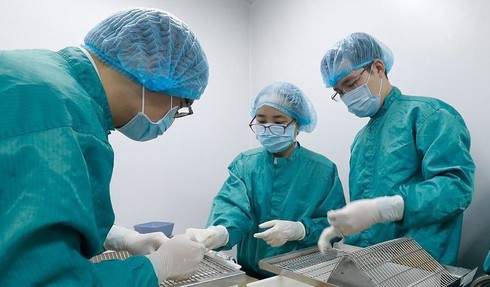 |
| MSc Mac Van Trong is confident Vietnam is able to produce quality vaccine against the coronavirus sought after by many countries worldwide |
MSc Mac Van Trong from the Company for Vaccine and Biological Production No.1 (VABIOTECH) under the Vietnamese Ministry of Health, said the project launched by him and his partners has so far achieved initial success, with the candidate vaccine recording high immunity levels.
“Our four-month long efforts have paid off,” Trong told VOV as he described the test results of the project which has gone on to receive financial support from VinGroup, the nation’s largest private investor, in addition to assistance from colleagues at the University of Bristol in the UK.
The latest major step in the project came on both May 15 and May 29 as researchers transferred two batches of serum samples taken from 50 vaccinated mice to the National Institute of Hygiene and Epidemiology (NIHE) to undergo evaluation. Following this, positive news came from the NIHE several days later as the serum samples had given antibody responses, some of which even recorded high antibody levels.
After recording these results, VABIOTECH has now completed its first phase a full two months ahead of schedule with the actions widely being considered to be the most important stage in the research and production of a COVID-19 vaccine. In the next stage of its creation, the candidate vaccine will be developed into a complete product which is safe for human use.
The research team is now poised to develop a commercial production process that is capable of meeting the demand of churning out millions or even tens of millions of doses of the vaccine.
 |
| VABIOTECH researchers are working hard on the first COVID-19 vaccine production project, hoping the vaccine will be available for human use in 9-12 months |
Similarly to colleagues from many countries globally, Vietnamese researchers are racing against time in an effort to manufacture their own vaccine against the COVID-19. The race is even more crucial as the world is facing the threat of a possible second wave of infection.
“It takes us nine to 12 months to produce a complete vaccine, but we are working hard to cut short the process,” Trong said. “However, 18 or 24 months would be really impressive figures when compared to the 10 year average it usually takes to produce a complete vaccine.”
According to the VABIOTECH representative, the project’s ambitious goal is not only to produce the long-awaited vaccine, but to also increase Vietnamese autonomy in terms of vaccine production, especially in the scenario that the pandemic strikes.
“If a new strain of coronavirus that is capable of causing another human pandemic emerges in the future, with the technology available, it will be possible to produce a new vaccine in a short space of time,” he said.
“It’s worth remembering that when the influenza A/H1N1 pandemic broke out previously, the vaccine was in short supply. Getting one dose of the vaccine was hard, not to mention buying millions of doses. Therefore, the vaccine initiative of a country is very important”, the researcher explained.
“Vietnam has excelled as a global bright spot in COVID-19 prevention and control. We pin high hopes on the following successes, including the “Made-in-Vietnam” COVID-19 vaccine production,” said Dr. Do Tuan Dat, director of the VABIOTECH. VOV